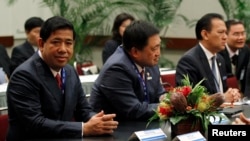A series of interviews intended to clear the name of embattled Cambodian tax chief Kong Vibol has raised further questions about his business dealings at home and abroad.
Most notably, Kong, general-director of Cambodia’s General Department of Taxation, has directly contradicted answers he gave to Al Jazeera in July about his family’s ownership of a petroleum company they accused of failing to register for tax for almost a decade.
He has also revealed he knew it was illegal for him to be listed as the director of an Australian firm while living in Cambodia years before he was again identified as the sole director of that firm in a filing with Australia’s corporate regulator.
This week, Kong hit back in a series of interviews with Cambodian pro-government media at a raft of allegations raised by Al Jazeera about the business empire he has amassed, claiming he was misrepresented.
“They totally censored. They edited it to make for a bad image and seemingly make me as a very bad person,” he told ruling party Senator Ly Yong Phat’s PNN network.
He repeatedly blamed “technical mistakes” for questionable business filings found in Australia and Cambodia.
Al Jazeera’s 101 East, which produced the investigation, has said it stands fully by its story.
“We report on the facts and facts alone,” 101 East Executive Producer Sharon Roobol wrote in an email, without answering Kong’s specific claims.
She also provided a full transcript of his interview.
It is hard to know specifically what Kong objects to as he has refused to answer phone calls and requests for comment.
In the interview with Al Jazeera, Kong said his family had long ago sold the firm Bright Victory Mekong Petroleum, which Cambodia’s official online business registry shows had only registered for taxes in 2017.
On Monday though he had changed his mind, telling PNN his family did indeed own the firm and had paid $230 million in taxes since registering in 2008.
He has repeatedly argued the 2017 tax registration record is inaccurate due to a widespread technical mistake found across the database.
Cambodia, where public officials on meager salaries frequently amass extraordinary fortunes, is ranked as the most corrupt country in Southeast Asia by Transparency International.
Preap Kol, Executive Director of Transparency International Cambodia, told VOA Cambodia’s political elite widely exploited this shadowy business environment.
“There are many high ranking officials and powerful politicians who have big businesses. Though they don’t have their names, they have their relatives or partners as representatives,” he said.
In 2016, Global Witness detailed a vast business empire estimate to be worth between $500 million and $1 billion controlled by the family of Prime Minister Hun Sen, who declared his sole income in 2011 to be a $13,800 per year government salary.
Officials on even less salary have built houses on land valued in the tens of millions of dollars, according to a 2015 investigation by The Phnom Penh Post.
Al Jazeera alleged Kong amassed millions of dollars of Australian property himself despite officially earning less than $12,000 year. He has since countered that his initial fortune came from early Cambodian property investments.
“These investment foresights are not illegal nor fraudulent as alleged and these gave me huge profit margins,” Kong told the Khmer Times, adding there were a sizable number of Cambodians “who are making a fortune exploiting this lucrative business.”
In what he claimed was another technical mistake, Kong said he accidentally became listed as the sole director and only shareholder of an Australian firm, Panhariddh Pty Ltd, while trying to do the exact opposite - resign the position and sell his full holdings to a relative.
Kong said he was only informed in 2012 that it breached Australian law for him the hold the directorship while living abroad, at which point his lawyers attempted to transfer the position.
“...an error was made and Harada [Kong] was removed as a director of the Company and his shareholding in the Company was transferred to you,” his Melbourne solicitor Mario Merlo explained in an August 8 letter presented on air by Kong.
But a 2014 Australian Securities and Investments Commission (ASIC) filing obtained by VOA also shows that years after Kong said he was informed of the breach, agents filed a document with the commission again naming him as director.
On July 20, 2018, shortly after the Al Jazeera interview, ASIC was notified that Kong had actually resigned as director of Panhariddh effective July 01, 2012 - a mistake for which he was fined.
Were he deemed to have lied to ASIC, Kong could be jailed for up to two years in Australia, the regulator had previously told VOA.
But in an email to VOA this week, ASIC’s Corporate Affairs communications manager Angela Friend suggested it was highly unlikely any action would be taken against Kong.
This week, Kong’s office paid several social media networks to promote his interview countering the personal accusations, leading to accusations he has misappropriated public funds.









